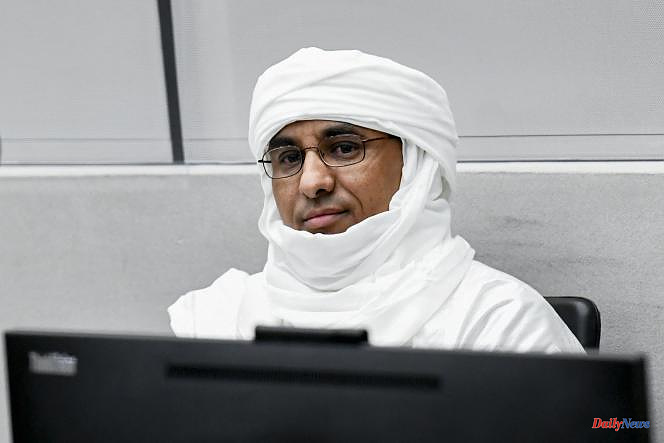According to the office of the prosecutor of the International Criminal Court (ICC), Abdulaziz Al-Hassan has left behind him a multitude of damning evidence. In delivering his indictment on Tuesday, May 23, deputy prosecutor Gilles Dutertre assured that he had "abundant" evidence to "demonstrate the guilt" of this former commissioner of the Islamic police in crimes against humanity and war crimes committed in 2012 during the occupation of northern Mali by jihadist groups.
Created at the end of 2012 by Iyad Ag-Ghali, the armed organization Ansar Dine, "a proxy" for Al-Qaeda in the Islamic Maghreb (AQIM) according to the prosecution, puts Timbuktu in a regulated cut. Originally from the region, Abdoulaziz Al-Hassan was one of the recruits responsible for making the link with the local population. But fear reigns. The city is changing radically, witnesses said during the three years of the trial. "Overnight, everything became haram, illicit, forbidden," said one. No more dancing, music, football, alcohol, cigarettes, charms, television...
At the Malian Solidarity Bank (BMS), the new commissioner Abdoulaziz Al-Hassan then fulfilled his mission with "zeal", continues the deputy prosecutor. On the pediment of the building is his own mobile number, 79 26 23 92, as a simple invitation to inform. "It is clear, it is without complex, specifies Mr. Dutertre, Al-Hassan clearly adheres to the intentions of Ansar Dine and AQIM, to establish their power and their control over the population and in particular over women. . The accused "is an important piece of the overall system of persecution," the prosecution asserts. It is "ubiquitous", "indispensable". In Timbuktu, "he summons, he patrols, he arrests, he interrogates".
"Interrogated and tortured, but in vain"
There are the thirty-nine police reports, which he writes and signs, "mentioning if necessary the use of torture". "It is written in full [in a report] by Al-Hassan: 'Interrogated and tortured, but in vain'", quotes the prosecutor. There are also videos, like the one in which the accused is seen whipping a young man. On another tour of a market, he is filmed ignoring pleas for mercy from a woman on the ground being flogged by another man.
Other images held by the judges but not shown in court show Abdulaziz Al-Hassan watching an execution. He "is so zealous, he does so much and so well in the eyes of the leaders of Ansar Dine and AQIM that he becomes the emir of the Islamic police towards the end of 2012 beginning of 2013", declares the deputy prosecutor.
The prosecution dwelt for long minutes on the fate of the women and girls of Timbuktu, often raped, sometimes subjected to slavery: "For months, they will live in a constant climate of oppression, insecurity and fear. They are harassed on a daily basis, they are hunted down in the streets, in schools, in hospitals and sometimes even in their own homes. »
"The Nightmare Cell"
The Malian Solidarity Bank ATM, now Abdulaziz Al-Hassan's HQ, is nicknamed by some women "the nightmare cell". Police sometimes detain women and girls there for weeks in the sweltering heat. They are not even taken to the toilet. "Six months later, when the forensic expert from the prosecutor's office went there, it still smelled like urine," Dutertre said. He further quotes one of the witnesses who "felt that these jihadists carried within them hatred of the female gender".
Behind a team of lawyers made up mainly of women, Abdoulaziz Al-Hassan listens without blinking, his hands joined. Melinda Taylor says her client joined Ansar Dine seven months after the occupation began. Her client would have had no other choice, and "when you start working for Ansar Dine, leaving the group is not an option," she says. His wife had just given birth, which would have made it impossible to flee to Mauritania. Above all, he was "Tuareg", adds the Australian lawyer and he would have been targeted by the Malian army, she says.
This trial is the second conducted by the ICC for the destruction of the mausoleums of Timbuktu. Another jihadist, Ahmad Al-Mahdi, served a nine-year prison sentence after pleading guilty to war crimes for the destruction of mausoleums in the city of 333 saints. The verdict of the ICC judges regarding Abdulaziz Al-Hassan will not be known for several months.












